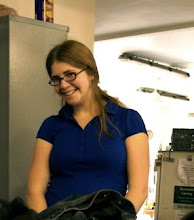That morning, along with several other Pardes students and other friends from around Jerusalem, I prayed with Women of the Wall. (see this post for more about WOW) It was a beautiful, unseasonably warm and sunny morning, a welcome change from the torrential rain of Rosh Hodesh Kislev. After, many friends, both in Israel and back home, asked how it was, and my immediate response was "uneventful." Considering that the first time I joined the Women of the Wall, Nofrat was arrested, anything else after that is relatively uneventful. In reality, there was a huge crowd of women (and a significant number of male allies) present to welcome in the joyful month of Adar with song, prayer, and dancing, and many on both sides of the mechitza who verbally and physically protested against our prayers.
There's a tradition that when Adar enters, joy increases, reflecting the joyousness of the Jewish community at having escaped genocide at the hands of Haman in the Purim story, and the general fun and craziness that accompanies the celebration of Purim today. That joy was definitely present that morning - with the warm (almost hot!) sun, we sang Purim songs "מישנכנס אדר מרבים בשמחה - when Adar comes in, we increase in joy!" as we walked the Torah to Robinson's Arch, the archaeological site next to the Kotel that has been designated for egalitarian and women's prayer and Torah services. Despite the anger that I heard and saw at the Kotel - several ultra-Orthodox women literally pushed their way into our group to try and disrupt our davening, while a large group of haredi men, armed with a megaphone, bellowed "GEVALT" (like oy gevalt - Yiddish for things that are really bad), yelled that we weren't Jewish, and that there is one Torah and it cannot be changed - the predominant emotion among the women I prayed with on Rosh Hodesh was that of the joy that one could find in any synagogue in Jerusalem on the morning of Rosh Hodesh Adar.
The same day, Pardes as a community had a "Yom Iyun shel Chesed" (translation: Mitzvah Day), in memory of two former Pardes students who were killed in a terrorist attack at the Hebrew University in Jerusalem in the summer of 2002. That afternoon, I got on a bus with 50 other Pardes students, faculty, and their family members to go to a farm outside of Rehovot to pick produce for an organization called Leket. Leket, whose name comes from the commandment in the Torah to leave behind in your field the produce that falls or doesn't get picked in the harvest for the poor of the community to glean, is a food rescue organization that collects produce from farms and leftovers from parties, wedding halls, etc. We visited a farm that exists purely to provide fruits and vegetables for those lacking food security, and spent the hot afternoon picking oranges (and eating a couple). It was great to be able to be outside on such a beautiful day, and we picked 3 TONS of oranges, which were distributed into kids' lunches for school the next day.
One of the challenges I've had since even getting to Pardes was thinking about transitioning from working and acting in the world to sitting and learning, for its own sake, full-time. This was compounded when Rav Landes, the rosh yeshiva at Pardes (the #1 in charge), in talking about etiquette in the beit midrash to the whole community, included among his etiquette rules that not only should cell phones and email not be used in the beit midrash, but the news shouldn't be read also. For me, my study of Jewish text in the beit midrash is incomplete without that connection to the rest of the world. Yes, I am studying Torah for its own sake this year, but not with blinders on. Pardes does not constrain its activities to the beit midrash - Yom Iyyun shel Chesed, and our weekly volunteering (there are no classes on Tuesday afternoons, and most students volunteer at various non-profits in and around Jerusalem). Reflecting on my time so far in Jerusalem, particularly through talking with Rabbi Gold and Shir Tikva's 11th and 12th graders while they were here last week, I realized that I really haven't limited myself to my learning in the Pardes beit midrash. Through my volunteering (more on that in a future post), time with Women of the Wall, and involvement with Encounter, I've embraced a teaching that Rabbi Gold shared with me last year: "My Torah is walking - I'm following it to the public square."
In that spirit...
Pardes is doing a community learn-a-thon this week to raise money for Haiti relief through AJWS, American Jewish World Service. As a community, we are all doing extra learning, our teachers are donating their time to teach evening classes on social justice issues, and we are reaching out to our friends and families to donate money in support of us and this dire humanitarian crisis. You can donate here.






